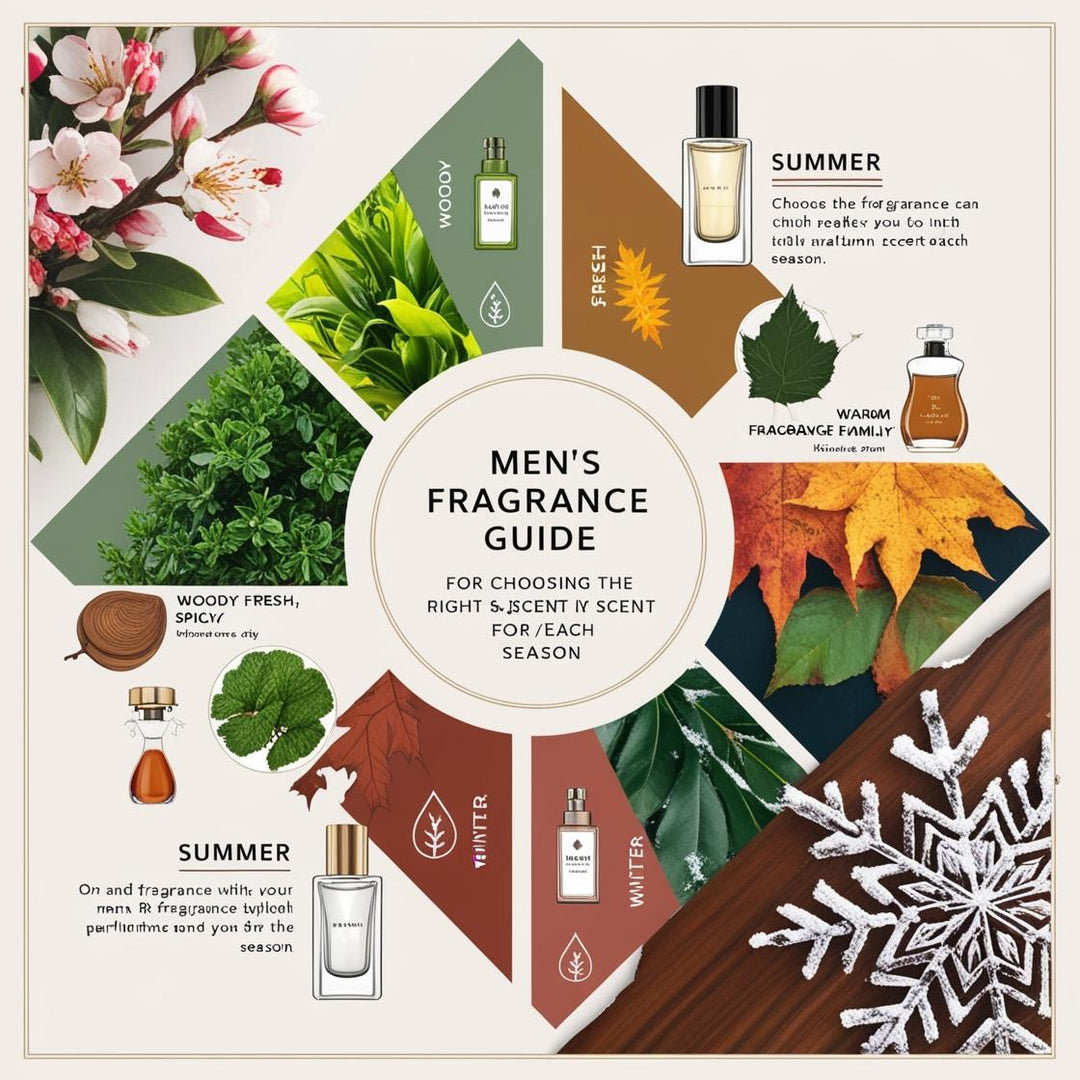Perfume Oils UK: A Beginner's Guide to Choosing the Perfect Scent
Choosing a perfume oil may seem challenging if you're searching for the perfect fragrance in the UK, especially with no previous knowledge.
But don't worry. We're here to guide you through the process and help you unlock the world of fragrance with the finest perfume oils.
Whether you're a first-time buyer or an experienced fragrance connoisseur, we'll share our knowledge and expertise to help you discover a new dimension of your signature scent.
So, join us on this journey and discover the perfect perfume oil for you!

What is Perfume Oil?
Perfume oils are concentrated fragrances made from synthetic or natural oils.
A range of scented products, from perfumes and colognes to deodorants and aftershaves, use perfume oil.
Unlike traditional perfumes, which are typically made with water and alcohol, perfume oils are pure, undiluted fragrances.
As a result, they tend to be more potent and long-lasting than traditional perfumes.
The Science Behind Perfume Oils Explained
Perfume oils have three distinct layers of scent: top notes, middle notes, and base notes. Specific fragrance ingredients used in the oil determine these notes. We can classify them as fresh, spicy, floral, or mixed notes
Top Notes/Head Notes
The top notes are the initial scents that are first noticed upon application and include fresh and rejuvenating aromas such as citrus, water, green, and fruity notes.
These scents are typically the most fleeting, lasting only 2-3 hours in perfume oils and 1 hour in traditional perfumes.
Middle Notes/Heart Notes
Middle or heart notes are the scents that become more prominent as the top notes evaporate. They are most commonly floral or oriental and last for 4-6 hours.
Base Notes/Bottom Notes
Base notes usually linger for 6-12 hours after the middle, and top notes have evaporated. They are the foundation of the fragrance and tend to be heavy and long-lasting.
These base notes can be woody, oriental, or a mixture. For those who prefer woody scents, perfume oils with a base note of wood aroma are a great option.
The lasting time of a fragrance can vary depending on the specific perfume oil used and the quantity applied.
It is also possible to create a perfume oil using only a single note, such as a woody base note.

Perfume Oils vs Essential Oils
Regarding perfumery, there are two main types of oils to consider–perfume oil and essential oil.
Essential Oils
Essential oil is a pure, concentrated extract derived from natural plant sources through a process such as steam or hydro distillation. These oils not only provide a pleasant fragrance, but they also offer additional benefits such as relaxation or anti-oxidant properties.
However, due to the high cost of raw materials and labour, essential oils can be pretty expensive. For example, it takes at least 30 years for an agarwood tree to mature before we can use them to extract the essential oil.
Perfume Oils
Perfume oils, on the other hand, are synthetic or factory-based products. However, synthetic oils can also come from natural sources.
They are typically made by mixing a small amount of essential oil with synthetic oil, which makes them widely available and less expensive than pure essential oils.
Additionally, perfume oils tend to last longer than essential oils.
However, it is worth noting that perfume oils are used solely for fragrance purposes and don't offer the extra benefits that essential oils do.
Types of Perfume Oil
Perfume oils are a popular alternative to traditional fragrances, offering a more natural and long-lasting scent. Various options are available, including Amaryllis, Bay Leaf, Bergamot, Cedarwood, and Citronella.
- Amaryllis Perfume Oil:
A warm, pleasant aroma with vanilla and woody notes, often used as a base note in blends.
- Bergamot Perfume Oil:
A cold-pressed oil with a sweet light orange peel scent and floral note, often used as a top note in perfumes.
- Bay Leaf Perfume Oil:
An aromatic oil with a warm, spicy, and slightly bitter undertone, commonly used in masculine fragrances.
- Citronella Perfume Oil:
Extracted from the leaves and stems of various Cymbopogon species, it has a sweet and spicy note. Fragrances use it for the effect of dewy leaves aroma.
- Cedarwood Perfume Oil:
Extracted from cedar tree needles, leaves, bark, and berries, it has a woody, evergreen scent. Insect repellent, cologne, shampoo, and deodorant use this perfume oil.
- Clove Perfume Oil:
A warm, spicy scent with hints of cinnamon and sweet undertones, often used as a middle note in perfumes.
- Gardenia Perfume Oil:
Made from freshly picked gardenia flower petals, it has a long-lasting and pleasant scent similar to white roses. It has a rich and heavy odour and is too strong to use alone, but we can soften it with other notes.
- Galbanum Perfume Oil:
Galbanum Perfume Oil is a gum resin containing aromatic oil that creates a green note in perfumes. It works as a fixative agent in perfumes.
- Ginger Perfume Oil:
This perfume oil has a warm and spicy scent with a fresh and lemony start and a pinky and soapy undertone. Oriental and modern fragrances use this oil.
- Geranium Perfume Oil:
Extracted from the Pelargonium graveolens plant leaves, it has an aromatic quality similar to lavender. We use them in many masculine perfumes and Fougere and Chypre accords.
- Hyacinth Perfume Oil:
This perfume oil derives from the flowers of Hyacinthus orientalis. It has a refreshing and energizing scent, like the smell of spring in a bottle.
- Jasmine Perfume Oil:
Jasmine is one of the most liked perfume oils. It adds smoothness and energy to a fragrance.
Jasmine oil has a sweet, romantic aroma and has been used for making some of the world's most famous perfumes for centuries.
- Patchouli Perfume Oil:
Patchouli perfume oil is commonly used in oriental fragrances. It derives from Patchouli leaves and has a musty exotic scent. Some people love it, while others despise it.
- Rose Perfume Oil:
Rose oil smells warm, intensely floral, slightly spicy, rich, and honey-like. It's one of the finest perfume oils used in creating many perfumes.
- Sage Perfume Oil:
Sage is a bushy plant with rough leaves. Its oil has an earthy aroma and a herbaceous scent which can reduce harsh notes in perfumes.
How to Choose the Right Perfume Oil For You
Few key things to remember while selecting a perfume oil for yourself are your preferences, age, gender, skin type, and diet. Even the weather can play a role in determining the best fragrance for you.
Citrus notes, such as blends of oranges and lemons, offer a refreshing and uplifting aroma. In contrast, water notes made up of marine and aquatic scents, are perfect for the modern and corporate world.
Skin Type
Your skin type is also an essential factor to consider when choosing a perfume oil.
Oily skin traps fragrance components better, so light, floral, and fresh notes are ideal for those with oily skin.
On the other hand, those with dry skin should opt for solid base notes that last longer.
pH Balance
It's also essential to consider the pH balance of your skin, as certain health conditions and environmental factors can affect it.
Choosing pH-balanced products and changing the environment you're exposed to can help improve the performance of your chosen perfume oil.
Lifestyle
Your diet and lifestyle can also play a role in the effectiveness of your fragrance.
Excessive alcohol consumption and spices like garlic and ginger can create a bodily odour that can interfere with your scent.
So it's essential to be mindful of your consumption and diet.
Weather
The temperature of the weather can also affect how long your fragrance lasts.
In the summer, perfumes tend to evaporate quickly, so it's best to opt for base notes.
In the winter or colder weather, fresh notes tend to last longer.
Personal Taste
Ultimately, the most crucial factor to consider is your own taste and style.
Research different perfume oils, try them on before purchasing, and pay attention to how the fragrance evolves over time.
Choose a scent that makes you feel confident and empowered and suits your personal style.
How to Apply Perfume Oils
There are a few different methods to choose from while applying perfume oils. Here are two popular techniques to help you get the most out of your fragrance.
Method 1: Traditional Application
- Start by cleaning and drying your hands thoroughly. Avoid applying perfume oils to sweaty or excessively dry skin.
- Using the application stick, swipe the perfume oil onto your pulse points, such as the wrists and the sides of your neck. Be careful not to rub the oil in, as this can alter the scent.
- You can also apply the oil to the back of your hand and then press your finger lightly to the subclavian artery just above your collarbones.
Method 2: Extended Scent Projection
- Take a generous swipe of perfume oil on the back of your hand.
- Pick it up with your finger and swipe it on your palm.
- Gently dab your palms together, being careful not to rub.
- Run your palms over the back of your neck, collarbone area, and the sides of your arms.
- If you're wearing a shirt or scarf, run your palms over them to prolong the scent. This method is perfect for going out for a long time and wanting to leave a lasting impression with your fragrance.
Benefits of Incorporating Perfume Oils into Your Daily Routine
-
Long-lasting scent:
One of the main benefits of incorporating perfume oils into your daily routine is their strong and long-lasting scent.
Unlike traditional fragrances that require reapplication, perfume oils can keep you smelling fresh all day without the hassle.
- Discreet application:
Using perfume oil eliminates the need for spraying in public, which can be uncomfortable for others.
Instead, you can discreetly apply the oil throughout the day to maintain a pleasant scent.
- Suitable for sensitive skin:
Perfume oils are an excellent option for sensitive skin as they do not contain alcohol, which can dry out or irritate the skin.
In addition, dry skins benefit from the moisture provided by perfume oils.
- Therapeutic effect:
Some essential oils used in perfumes, such as lavender and vanilla, have calming and relaxing properties that can reduce stress and anxiety.
Other oils, such as peppermint and eucalyptus, can have a stimulating and invigorating effect. Which makes them perfect for use in the morning to help you wake up and start your day on the right foot.
- Multiple Usage:
Another great benefit of perfume oils is that they are versatile, and we can use them in various ways.
They can be worn as a traditional fragrance or added to a diffuser to create a soothing and relaxing atmosphere in your home or office.
- Religious significance:
For Muslims, using perfume oils is the Prophet Muhammad's sunnah or good practice.
- Variety of scents:
You can find any perfume oil version of your favourite scent.
Overall, incorporating perfume oils into your daily routine can make you smell great, improve your mood, provide therapeutic benefits, and even boost your confidence. So why not try them and see how they can enhance your daily routine?
Perfume Oils vs Traditional Fragrance
Traditional perfumes, usually referred to as Eau de parfum or eau de toilette, and perfume oils differ in their chemical components and intended applications.
Perfume oils are usually created with a larger concentration of essential oils, making them stronger and remaining longer on the skin. Due to the absence of alcohol, which can dry out skin, they also tend to be more hydrating.
On the other hand, traditional scents use a combination of alcohol and essential oils, which can result in a lighter, more energizing fragrance. Additionally, they are typically more easily accessible and reasonably priced.
Types of Perfume Oils Uk People Prefer
Although people's choices for perfume oils vary in the UK, citrus, floral, and woodsy scents are some of the most common.
Women frequently choose floral aromas like rose, jasmine, and lavender, while males tend to prefer woodsy scents like cedar, sandalwood, and pine.
Due to freshness and stimulating qualities, citrus smells like lemon, orange, and bergamot are also well-liked.
Additionally, many want unisex and specialized perfume oils that could include rare and exotic components.
Frequently Asked Questions
-
How long does perfume oil stay on the skin?
Ans: The longevity of perfume oil on the skin can vary depending on factors such as skin type, application method, and environment. When applied to pulse points, the scent can project higher, but it may not be long-lasting.
-
How can I make my perfume oil last longer?
Ans: There are several methods to prolong the longevity of perfume oil. You can apply a small amount of vaseline, moisturizer, or olive oil to pulse points before applying the perfume oil. This locks in the scent and helps it to last all day. Wearing perfume oil on clothes can also help extend the scent's life. However, be mindful that some oils may stain, so it's best to choose dark-coloured clothing.
-
Can I layer perfume with essential oil?
Ans: Layering perfume with essential oil can enhance the scent and make it last longer. Choose a base note essential oil and apply it to pulse points before spraying the perfume. Gently tap the oils together to blend them. Keep in mind that the essential oil scent may be stronger due to its concentrated nature.
-
Is perfume oil good for the skin?
Ans: In general, perfume oils are safe for the skin and can provide benefits such as hydration for dry skin. However, it's necessary to research the ingredients and perform a patch test before applying it topically, to check for any allergies or sensitivities.
Final Words
Using perfume oils regularly can have many advantages, including gentler to skin and a stronger and more lasting aroma.
Whether you're searching for a classic musk aroma or something more contemporary and distinctive, there are various options available for perfume oils UK.
Additionally, many perfume oils are produced in the UK using natural components, making them a greener alternative to traditional perfumes.
So, if you're seeking a fresh aroma, think about experimenting with perfume oil for a more all-natural and durable scent.
Read More
1. How to Make Fragrance Oils: Easy Steps for Custom Scents
2. Why Room Fragrance Oils are a Game Changer for Your Home
3. How Can You Use Perfume Oil in a Diffuser for Long-Lasting Fragrance





Leave a comment